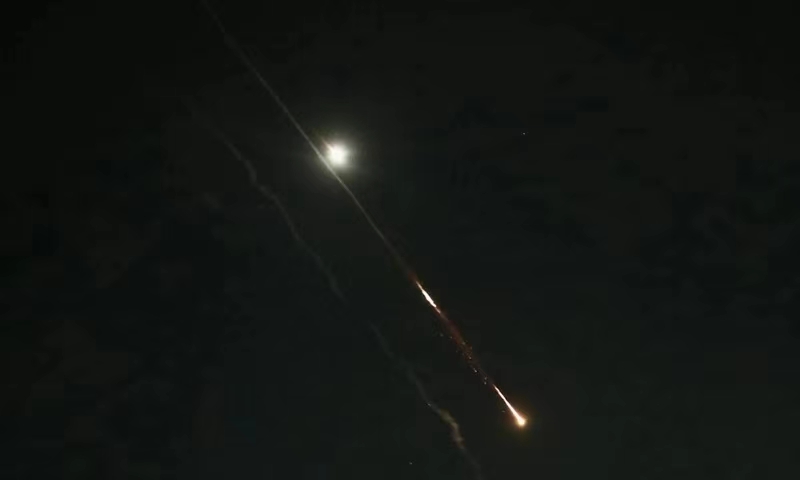近日,中阿改革发展研究中心秘书长王广大教授在Global Times上发表题为“Will restraint prevail over escalation after Iran's counterattack on Israel? ”的文章,全文如下:

This photo taken on April 14, 2024 shows flares from explosions in the sky over Jerusalem as Israel's Iron Dome anti-missile system intercepts missiles and drones from Iran. A combined attack of dozens of ballistic missiles and hundreds of drones from Iran triggered air raid alerts across Israel early on Sunday, the Israeli army said, as residents reported multiple bombings were heard. Photo: Xinhua
Late on April 13, Iran launched drone and missile attacks against Israel in retaliation for the bombing of its consulate on April 1. Subsequently, Iran army claimed to have "achieved all its objectives," while Israel stated that it intercepted most of the drones and missiles, resulting in "minor damage." From Iran's perspective, this round has concluded.
At present, all parties are prepared for both scenarios, but emphasis remains on restraint rather than escalation. Iran continues to exercise strategic restraint, avoiding large-scale war with Israel and the risk of US' involvement. It's fair to say the timing and scale of Iran's retaliation against Israel corresponded to US predictions. On April 12, US President Joe Biden said Iran's attack could come "sooner, rather than later." Subsequently, on April 13, Iran launched attacks on Israeli territory. The Iranian Permanent Mission to the UN posted on social media that Iran's attacks on Israel "can be deemed concluded."
Several characteristics distinguish this round of attacks. First, it marks the first direct assault between Iran and Israel on each other's territory, increasing the likelihood of open confrontation in the future.
Second, despite multiple interceptions by the US and Israel, and Israel's announcement of successfully intercepting most of Iran's drones and missiles, it still shattered the myth of Israel's Iron Dome defense system being impregnable. This, to some extent, bolstered the determination and confidence of Iran and the "resistance forces" to strike Israel.
Third, while Iran launched its attacks, Lebanon's Hezbollah and militia groups of Iraq and Yemen simultaneously targeted Israel, creating a multi-front attack, which was disadvantageous for Israel. While the US remains steadfast in supporting Israel's defense against external attacks, it does not encourage escalation and has explicitly stated that it doesn't seek conflict with Iran.
Future developments hinge on two factors. First, Israeli Prime Minister Benjamin Netanyahu's response, as Israel intends a "significant response" to the attack. The Israeli Security Cabinet has authorized the war cabinet to decide on Israel's response to the Iranian attack.
Second, the extent of pressure exerted by Biden on Netanyahu. While expressing support for Israel's defense against Iranian attacks, President Biden openly declared that the US would oppose any Israeli counterattack and urged Israel not to escalate the conflict further.
Despite causing casualties and property damage in the Israeli strike on the Iranian consulate, the US did not condemn Israel. However, it strongly condemned Iran's attack on Israeli military facilities. As an influential player in the Middle East, the US should play a constructive role in maintaining regional peace and stability rather than taking sides.
Based on Israel's interpretation of the recent attack, it seems unlikely that Israel will launch a large-scale attack on Iran in the immediate future. The Israeli side claimed they successfully intercepted Iran's attacks, causing minimal damage. Even Biden told Netanyahu that "tonight was a win." Following a two-hour situation assessment with the war cabinet, Netanyahu concluded, "We intercepted. We blocked. Together we will win."
The attacks on Israel have helped calm domestic sentiments in Iran and achieved certain level of revenge. As a result, the likelihood of both sides rapidly escalating tensions again is small.
To fundamentally resolve the issue of confrontation among regional countries, it is essential to address the root cause of the Israel-Palestine conflict in order to restore peace to the region. Political leaders in the region should prioritize safeguarding the lives and properties of their people, recognize the importance of collective security, and refrain from pursuing absolute security at the expense of other nations' security, which could lead to the escalation of regional conflicts and ultimately disrupt regional peace and development.
